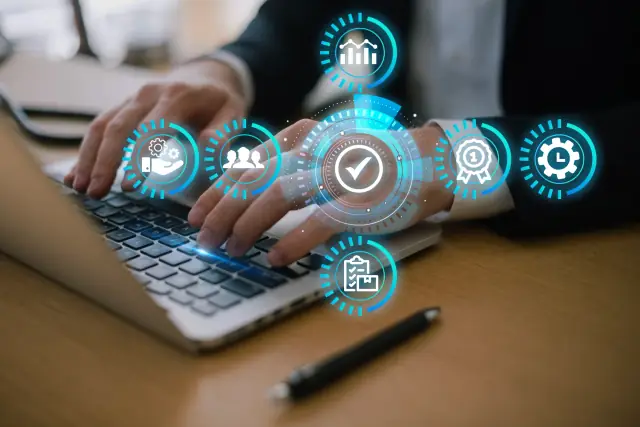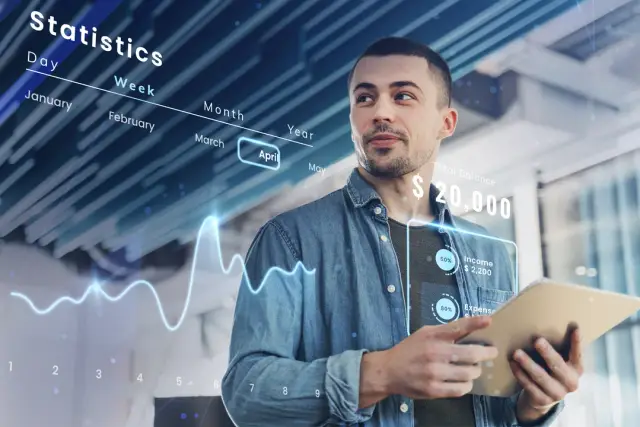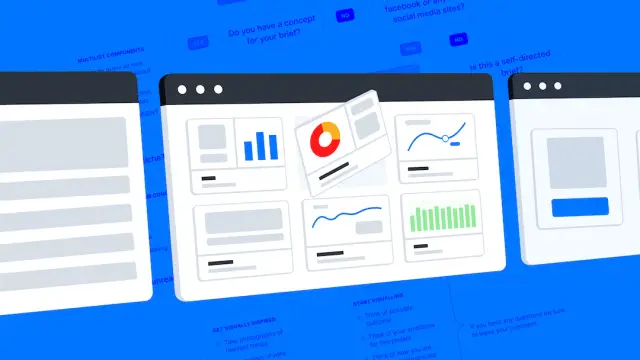The Future of ERP: Trends to Watch Out For
Explore the upcoming trends and innovations in the world of ERP, including AI, IoT, cloud computing, no-code/low-code platforms, and more, and learn how they'll shape the future of enterprise resource planning software.

Enterprise Resource Planning (ERP) systems have become essential tools for businesses of all sizes, streamlining and automating key operational areas like finance, human resources, supply chain management, and customer relationship management. As we embrace the digital era, the future of ERP is brimming with potential for revolutionary advancements that will reshape the business environment. In this article, we will explore the exciting trends that are set to redefine ERP systems, enabling organizations to operate more efficiently and effectively.
ERP and the Power of Artificial Intelligence
Artificial Intelligence (AI) has the potential to significantly enhance ERP software by automating tasks, fostering data-driven decision-making, and providing valuable insights. As AI becomes more sophisticated, ERP systems can leverage this technology to streamline business processes and deliver better outcomes.
Here are some ways AI can augment ERP systems:
- Data Analysis: AI-powered algorithms can process massive amounts of data to uncover patterns and trends that would otherwise go unnoticed. This helps businesses identify key performance indicators (KPIs), track progress toward goals, and make data-driven decisions.
- Accurate Forecasting: AI can analyze historical data and current trends to predict future outcomes and fluctuations, such as sales, demand, and resource availability. This helps businesses plan better, allocate resources effectively, and be prepared for changes in the business environment.
- Task Automation: By automating repetitive tasks and routine processes, AI can save time and reduce errors while freeing up employees to focus on strategic and creative tasks that add more value to the business.
- Predictive Maintenance: AI can anticipate and flag potential equipment failures by constantly analyzing sensor data and historical patterns. By identifying potential issues early on, businesses can schedule maintenance proactively, minimizing downtime and reducing costs.
- Process Optimization: AI can help businesses identify inefficiencies in their workflows by analyzing data from various sources, such as customer interactions and employee performance metrics. Businesses can then make data-driven decisions to enhance their processes and improve overall productivity.

AI integration within ERP systems is still in its early stages, but as the technology matures and becomes more accessible, its impact on ERP software will only continue to grow.
IoT Integration with Enterprise Resource Planning Systems
Internet of Things (IoT) devices are becoming increasingly prevalent in businesses of all sizes and can provide valuable real-time data and insights for ERP systems. Connecting physical devices and sensors with software platforms helps businesses streamline processes, make data-driven decisions, and operate more efficiently.
Here are some ways IoT can enhance ERP systems:
- Real-time Data and Insights: IoT devices can collect and transmit real-time data from various sources, such as factory floors, warehouses, and transportation systems. ERP systems can then analyze this data to improve decision-making, monitor performance, and optimize operations.
- Improved Connectivity: IoT devices help connect disparate systems and processes, facilitating seamless data sharing and collaboration between departments and teams. This improved connectivity can lead to better decision-making and increased efficiency.
- Automation and Control: IoT devices can automate routine tasks and processes, such as controlling equipment and managing inventory levels. These devices can be controlled remotely, enabling businesses to respond quickly to changing conditions and reduce manual intervention.
- Predictive Maintenance and Inventory Management: IoT devices can monitor the health of equipment and track inventory levels, alerting businesses to potential issues before they become critical. This can help businesses plan maintenance and replenishments better, ultimately saving time and resources.
IoT integration is poised to play an even more significant role in the future of ERP software as businesses continue to adopt connected devices and seek innovative ways to leverage the massive amounts of data they generate.
Cloud-First Approach to ERP Solutions
As more businesses embrace digital transformation, cloud-based ERP systems are becoming the go-to choice over their traditional on-premises counterparts. A cloud-first approach to ERP brings several advantages, such as easier access to data and applications, improved scalability, lower upfront costs, and automatic updates.
Here are some benefits of a cloud-first approach to ERP:
- Accessibility: A cloud-based ERP system can be accessed on any device with an internet connection, making it easier for employees to access information and collaborate while on the go or at remote locations. This flexibility also enables businesses to implement bring-your-own-device (BYOD) policies, potentially reducing hardware costs and improving employee satisfaction.
- Scalability: Cloud-based ERP solutions can be easily scaled up or down to meet changing business needs, without the need for significant hardware investments. This makes it easier for businesses to adapt to fluctuations in demand and to grow their operations over time.
- Lower Upfront Costs: Cloud-based ERP systems typically operate on a subscription basis, meaning that businesses can avoid large upfront costs associated with purchasing and maintaining hardware and software. This can make ERP solutions more accessible to small and medium-sized businesses that may not have the resources for a traditional on-premises implementation.
- Automatic Updates: Cloud-based ERP providers can push updates and enhancements to their software automatically, ensuring that businesses always have access to the latest features and functionality. This helps businesses stay more current with industry trends and best practices, while also reducing the resources required for system maintenance and administration.
The cloud-first approach to ERP solutions is becoming increasingly popular as businesses seek cost-effective and agile solutions to manage their resources. As more ERP vendors prioritize cloud-based offerings and features, this trend is likely to continue shaping the ERP industry for years to come.
Increasing Adoption of No-code and Low-code Platforms
One significant trend in the world of ERP is the increasing adoption of no-code and low-code platforms in ERP development. Traditionally, ERP systems have been developed using high-level programming languages and extensive coding expertise. This approach often resulted in long development times, increased costs, and the accumulation of technical debt.
With no-code and low-code platforms, businesses can quickly develop and deploy customized ERP solutions without the need for extensive coding expertise. No-code platforms like AppMaster enable non-technical users to create applications through visual drag-and-drop interfaces, making the development process faster, more cost-effective, and accessible to a broader range of users, from small businesses to enterprises.

Low-code platforms, on the other hand, offer a blend of code-free development and traditional programming for more flexibility and control, making it easier for developers to create and modify ERP applications in line with changing business requirements. The combination of no-code and low-code platforms allows for faster time-to-market and a reduction in technical debt, enabling companies to adapt more quickly to changing market conditions.
As businesses realize the advantages of no-code and low-code platforms, these tools will become even more popular in the ERP industry. The ability to quickly create customized solutions without the need for extensive programming expertise opens up opportunities for organizations of all sizes to optimize their ERP systems and improve their overall efficiency.
Focus on Improved User Experience and Accessibility
Lately, there has been a big emphasis on user experience (UX) design. Companies now understand the importance of creating attractive and user-friendly interfaces for their products. This shift is also seen in the ERP industry, where vendors are improving the usability and accessibility of their systems.
An intuitive user interface can significantly impact the success of ERP implementation by improving user adoption rates, reducing the learning curve, and boosting overall productivity. As a result, ERP vendors are increasingly prioritizing UX design and investing in research and development to create user-centric interfaces that cater to the diverse needs of their users. This includes designing for various device types (mobile, desktop, tablet) and implementing responsive UIs that work seamlessly across different screen sizes and resolutions.
Accessibility is another critical aspect of future ERP systems, as vendors strive to ensure that their software is usable by individuals with diverse abilities. This commitment to accessibility includes designing for text-to-speech functionality, implementing high-contrast color schemes, and leveraging accessible web standards to cater to users with varying physical, visual, and cognitive abilities.
In the future, we can expect even greater emphasis on user-centered design and accessibility as businesses recognize the value of smooth, engaging, and inclusive interfaces that drive user satisfaction and productivity.
Enhanced Security and Data Privacy Standards
As businesses become more reliant on ERP systems to manage their operations, the need for powerful security and data privacy measures is more important than ever. With a wealth of sensitive information stored within their ERP systems, organizations must ensure that they are adhering to industry standards and maintaining strict security and privacy protocols.
Some of the key security trends in the ERP industry include investing in encryption mechanisms, implementing multiple layers of authentication, and regularly monitoring and updating systems to guard against new threats and vulnerabilities. Additionally, with the increasing adoption of cloud-based ERP systems, organizations are focusing more on securing their data in transit and at rest, and working closely with cloud providers to ensure the integrity and confidentiality of their information.
Data privacy is a great concern for businesses worldwide. Strict rules like GDPR in the EU and CCPA in the US show how serious it is. These regulations make it necessary for organizations to safeguard customers' personal information, be transparent, and take responsibility for how they handle data. As a result, ERP vendors need to keep improving their privacy controls and using advanced measures to protect data. This way, they can help their clients follow the changing rules and stay compliant.
The future of ERP will likely see an increased focus on security and data privacy as organizations face stricter regulatory requirements and the ever-evolving threat landscape. By investing in the latest security technologies and adhering to best practices in data privacy, ERP vendors can instill confidence in their clients and maintain a strong reputation in the industry.
The Role of Blockchain in ERP Revolution
Blockchain, the distributed ledger technology behind cryptocurrencies like Bitcoin, is making inroads into various industries, including enterprise resource planning. Although the application of blockchain in ERP may still be in its early stages, many companies are realizing the potential benefits of integrating this technology into their ERP systems. Some of the key ways blockchain can revolutionize ERP include:
Enhanced Transparency and Traceability
Blockchain offers transparency at its core by providing an immutable record of all transactions and data transfers. As a result, businesses can create a fully traceable record of their inventory movements, orders, and other transactions throughout the supply chain. This level of transparency can help improve trust between organizations, enhance collaboration, and bolster market confidence in the generated data.
Improved Security and Data Integrity
Blockchain technology has another advantage: it's highly secure. The data stored in blockchain is protected using advanced cryptographic methods. If someone tries to change the stored data, it would be quickly noticed because it won't match the cryptographic signature. This high level of security in ERP systems can safeguard important business information like customer data, financial records, and intellectual property.
Smart Contracts for Streamlined Business Processes
Smart contracts, which are self-executing contracts with the terms and conditions directly written into the blockchain code, can help automate recurring tasks and agreements within an ERP system. By implementing smart contracts, businesses can automatically enforce agreements and facilitate transactions without the need for manual intervention. This can lead to more streamlined processes, reduced administrative burdens, and increased efficiency in executing business tasks.
Efficient Supply Chain Management
Blockchain can also help enhance supply chain management by automating many traditionally manual processes and providing better visibility into the entire lifecycle of goods and materials. With blockchain-enabled ERP systems, companies can conduct real-time tracking and tracing of products from manufacturers to distributors to retailers. This can help ensure product authenticity, reduce counterfeiting, and provide consumers with greater confidence in the products they purchase.
Reduced Data Silos and Improved Data Sharing
Blockchain technology can serve as a bridge between various ERP systems within a company, enabling seamless data flow and fostering collaboration. By connecting different ERP modules and business functions through a unified, blockchain-based platform, companies can reduce data silos and improve information sharing among various departments.
Collaboration and Integration with Other Enterprise Systems
The future of ERP systems will increasingly focus on seamless collaboration and integration with other enterprise systems to enhance overall business efficiency. The integration of ERP systems with other critical business applications, such as customer relationship management (CRM), human resource management (HRM), and e-commerce platforms, can help drive data synchronization and improve decision-making.
Centralized Data Management
ERP systems must be capable of consolidating and centralizing all the relevant data from different business units, teams, and applications. This enables businesses to have a 360-degree view of their operations, allowing them to make more informed, data-driven decisions.
Data Integration with CRM and HRM Systems
Integrating ERP systems with CRM and HRM applications can enhance customer and employee experiences, streamline processes, and reduce manual data entry. For example, businesses can synchronize their customer data between CRM and ERP to track sales orders, invoicing, and financial history more efficiently. Integration with HRM systems can help manage employee data, such as attendance, payrolls, benefits administration, and recruitment.
E-commerce Platform Integration
For businesses that have an e-commerce presence, integrating ERP systems with e-commerce platforms can help manage inventory, orders, and customer data across both online and offline channels. Integration with e-commerce platforms can streamline order processing, improve inventory management, and ensure accurate and consistent data across all channels.
Utilizing APIs for Custom Integrations
APIs (Application Programming Interfaces) serve as the bridge between various software applications, enabling them to "talk" to each other and efficiently exchange data. ERP systems that support API integration can be easily connected to other enterprise systems, including custom solutions developed by the businesses themselves or using no-code/low-code platforms like AppMaster. This approach enables a high degree of flexibility and customization to tailor the ERP solution to a company's unique needs and requirements.
Increased Automation and Real-Time Data Flow
When ERP systems are integrated with other enterprise systems, it becomes much easier to automate various processes and workflows. These integrated systems ensure that data is continuously flowing between applications in real-time, making it easier for businesses to operate more efficiently and accurately. In addition, real-time data flow can help businesses react more quickly to market changes, customer demands, or other operational challenges.
Conclusion
The future of ERP systems will be driven by a combination of innovative technologies, including AI, IoT, cloud computing, no-code/low-code platforms, and blockchain technologies. Additionally, the focus on collaboration, integration, and improved user experience will continue to shape the evolution of ERP systems. By embracing these trends and innovations, businesses can stay ahead of the curve and reap the benefits of more efficient and powerful enterprise resource planning solutions.
FAQ
Some future trends in the ERP industry include artificial intelligence (AI) integration, IoT integration, a cloud-first approach, the adoption of no-code/low-code platforms, improved user experience and accessibility, enhanced security and data privacy standards, and the use of blockchain technology.
AI enhances ERP systems through improved data analysis, accurate forecasting, automation of tasks, predictive maintenance, and optimizing processes by identifying inefficiencies.
IoT plays a significant role in the future of ERP by providing real-time data and insights, improving connectivity, enabling automation, and helping in predictive maintenance and inventory management.
No-code and low-code platforms like AppMaster allow businesses to quickly develop and deploy customized ERP solutions, enabling greater flexibility and cost-effectiveness while reducing development time and technical debt.
A cloud-first approach in ERP systems ensures easy access to data and applications on any device, better scalability, automatic updates, and lower upfront costs.
Enhanced security and data privacy standards in ERP systems protect sensitive business data, maintain regulatory compliance, and help in trust-building with customers and stakeholders.
Blockchain technology can bring increased transparency, immutability, and security to ERP systems by providing a distributed and tamper-proof ledger to track and record transactions and other data.
Integration of ERP systems with other enterprise systems ensures seamless data flow, improved efficiency, better collaboration, and streamlined workflows across business functions.





